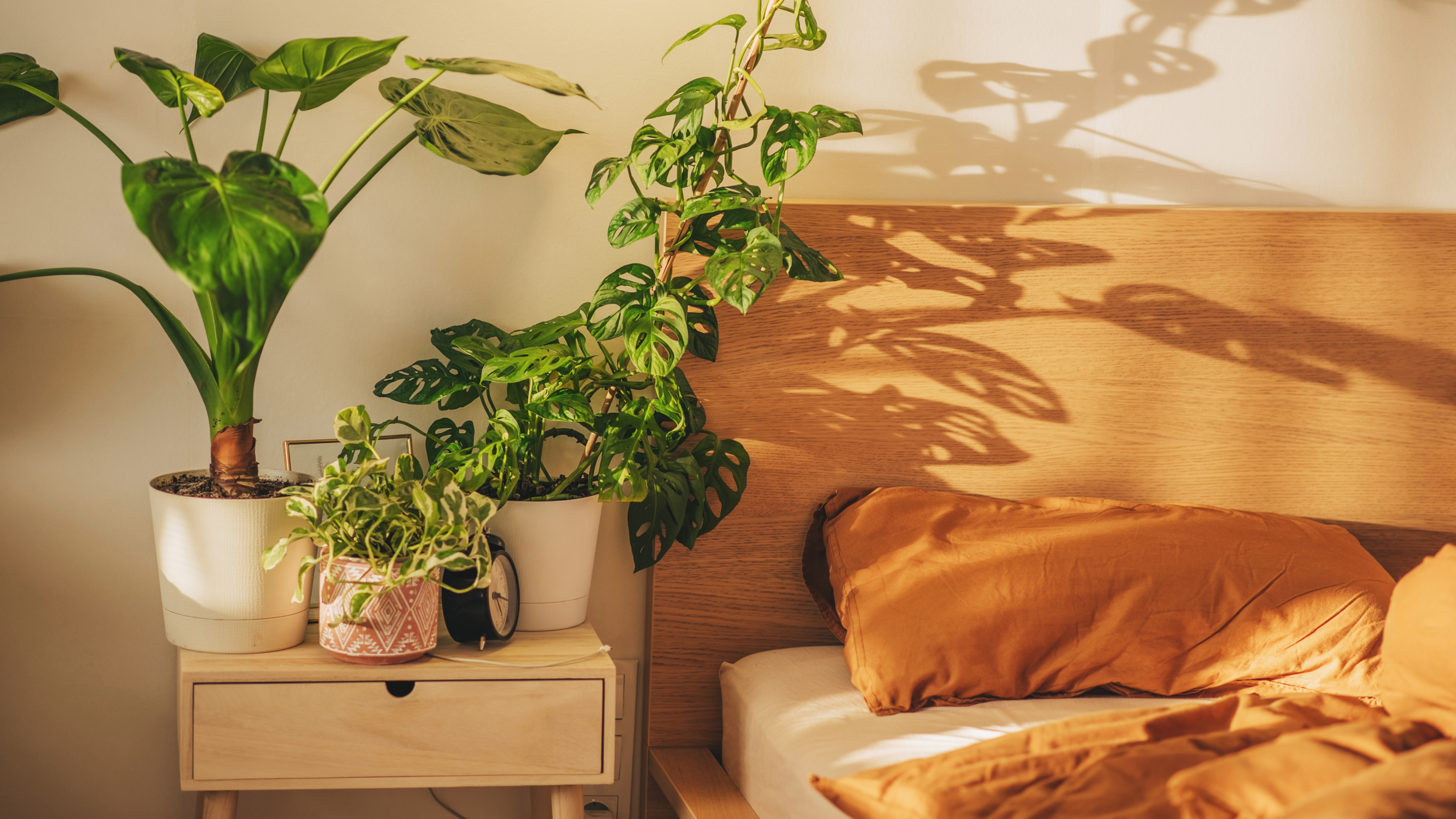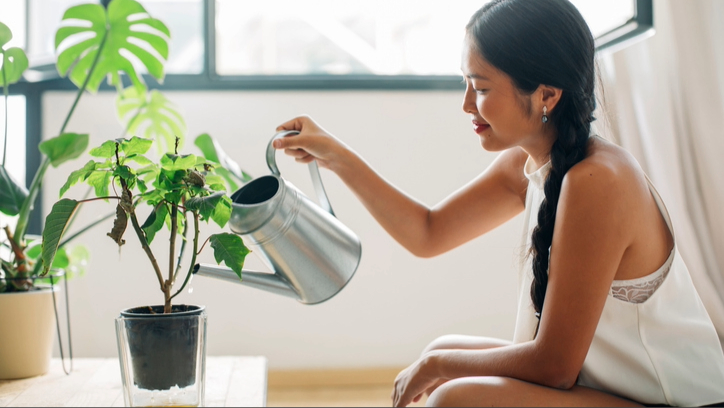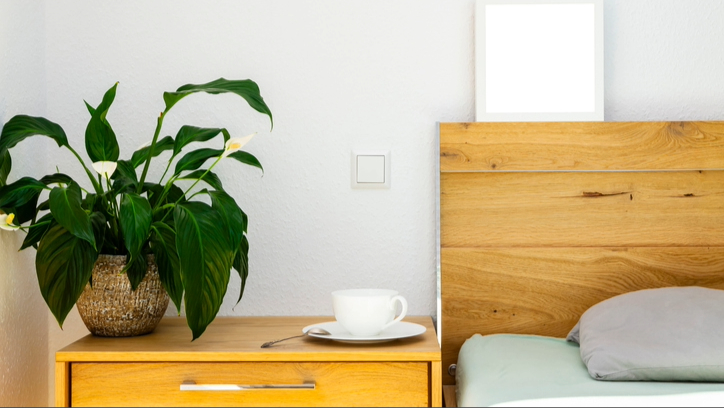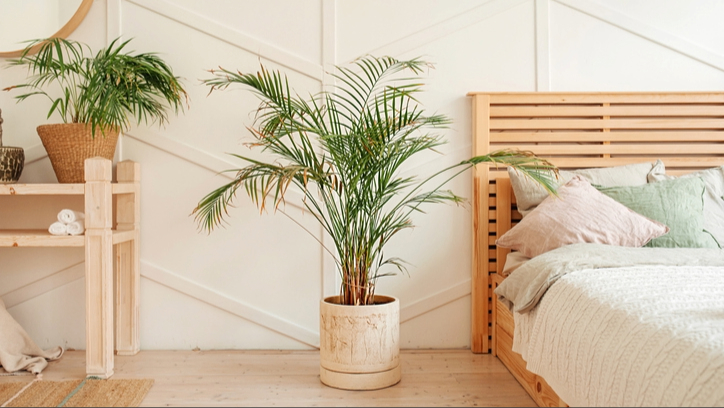This TikToker reckons bedroom plants can improve your sleep quality, but do the experts agree?
Want to improve your sleep? Add these plants to your bedroom, say experts

TikTok gardener Michael Griffiths, known as the Mediterranean Gardener online, claims houseplants can help you fall asleep faster and get better sleep through the night.
If you're still struggling to sleep despite sleeping on the best mattress for your sleep needs and following recommended sleep hygiene practices, your unlikely sleep fix may be houseplants, Griffiths reckons.
But what does the science say? While there are conflicting studies surrounding whether houseplants really can purify your air, there is further suggestion that certain houseplants are better than others at removing harmful Volatile Organic Compounds (VOCs) from the air and increasing oxygen levels.
We called upon gardening and plant expert at Fantastic Gardeners, Petar Ivanov, and trained behavioral sleep medicine clinician and founder of National Sleep Center, Andrew Colsky, to find out exactly how plants can help you sleep and which plants specifically are best kept in the bedroom.
Can bedroom plants help improve your sleep?
From enhancing air quality to aiding well-being, keeping plants in your bedroom brings a host of sleep benefits.
Many plants only carry out photosynthesis — which, as you can probably recall from a long gone biology lesson, involves removing carbon dioxide from and releasing oxygen into the air — in response to daylight.
But some plants continue releasing oxygen during the night too, and these make the best bedroom plants, according to Griffiths. This is because they can improve respiratory functioning, aiding more restful sleep.
Sign up to get the BEST of Tom's Guide direct to your inbox.
Get instant access to breaking news, the hottest reviews, great deals and helpful tips.
Colsky adds: "Even the act of viewing a plant, which allows us to visualize nature in our environment, can lower the stress hormone cortisol and promote a feeling of calm." This sense of serenity helps us fall asleep.
@themediterraneangardener ♬ original sound - Michael - Gardening tips
How do plants help you sleep better?
Plants can help you sleep better through a variety of mechanisms. Firstly, many plants filter toxins and release oxygen to improve air quality, explains Ivanov. Better air quality translates to better sleep quality as you are less likely to be kept awake by respiratory irritations when breathing in cleaner air at night.
Plants also regulate humidity and temperature levels. This is important because room temperature plays a key role in sleep onset and high humidity can make you feel clammy and overheat at night, causing restlessness.
Meanwhile, low humidity can dry out nasal passages, causing breathing problems that disrupt sleep. Ivanov says: "Plants release moisture through transpiration, which can prevent dry air that irritates the respiratory system."
What's more, people tend to put plants in their bedrooms for aesthetic purposes, but this is good news for sleep too. Researchers from the University of Reading found the green colors of houseplants has a calming effect.
Therefore, incorporating green plants into your bedroom interior can help you manage stress and wind down at the end of the day, making it easier to drift off peacefully.

Ivanov explains: "Caring for plants has psychological benefits that contribute to overall well-being." Free of stress and illness, you are more likely to fall asleep fast and bag better quality ZZZs through the night.
Additionally, aromatherapy comes into play. "Some plants emit soothing scents, fostering a calming atmosphere conducive to sleep," says Ivanov.
5 of the best bedroom plants for better sleep
Focusing on certain functions such as overnight oxygen production and calming scents will help you find the best sleep-boosting plants. Here are a handful of expert-approved recommendations...
Peace lily
NASA compiled a list of the best plants to clean indoor air, and the Peace lily made the cut. By helping to remove mold spores and VOCs from the air, peace lilies contribute to a healthier, allergen-free sleep environment.
Ivanov says: "Peace lily increases humidity and filters toxins, aiding respiratory comfort during sleep." With less sneezing and coughing keeping you awake, you can get quality shut eye with a peace lily present.

Lavender
Lavender helps you sleep by releasing "a calming and sleep-inducing aroma", says Colsky. Lavender scent is known to promote relaxation and reducing anxiety. A study by the University of Minnesota showed inhaling lavender was associated with better sleep quality among participants with self-reported sleep issues.
Ivanov adds: "Lavender reduces heart rate and blood pressure, promoting deeper sleep." Prompting relaxation to help you fall asleep peacefully, a lavender plant makes a brilliant bedside companion.
Snake plant
Snake plant also makes it into NASA's list of best air purifiers. It is recognised for its air-purifying and moisture absorbing properties, helping maintain a comfortable sleep environment and balance humidity levels, which, Colsky says, "can reduce dry skin and nasal passages and improve breathing."
Plus its oxygen supply doesn’t switch off at night. The combination of air purification and increased oxygen levels ensures our cells are getting enough oxygen to recharge and recover overnight, improving overall sleep quality.
A bonus is that snake plant is a low maintenance plant that tolerates low light and infrequent watering, meaning you won't be losing sleep over your care responsibilities as a plant parent.
Jasmine
"Jasmine is known for its aroma, which has been linked to reduced anxiety and improved sleep quality," says Ivanov.
The plant's sweet aroma prompts relaxation, stopping you tossing and turning at night. A study from German researchers proved the smell of jasmine could be used as a natural sleeping pill and mood enhancer.
Additionally, like all the best bedroom plants. jasmine plants can absorb pollutants and freshen the air, contributing to a healthier sleep environment.
Areca palm
Areca palm can remove toxins from the air. It is particularly good at absorbing chemicals like formaldehyde, benzene and trichloroethylene which can be present in indoor environments from furniture, paint and cleaning products.
The plant also releases oxygen at night and controls humidity levels. As we know, this can help skin irritations and respiratory issues, and help you regulate your sleep temperature, leading to a more comfortable sleep environment.
The lush leaves also add a tropical atmosphere to your sleep space, which many people may find relaxing. The sense of tranquility can help you fall asleep.

How else can plants improve sleep?
Browse any health store shelves for sleep teas or supplements and you're sure to come across the likes of chamomile, ashwagandha and valerian root.
A staple in many nighttime routines, herbal teas are excellent bedtime drinks thanks to their calming effects (be they placebo or not). Chamomile is said to have mild sedative effects, helping to relax the nervous system for sleep.
Meanwhile ashwaganda and valerian root are herbal remedies commonly used to combat insomnia. Although further research is needed, studies indicate ashwagandha has positive outcomes on sleep quality, while other research has found valerian root is safe and useful in treating sleep problems and anxiety.

Eve is a PPA-accredited journalist with an MA in Magazine Journalism from Cardiff University. She is a Sleep Staff Writer at Tom’s Guide and has four years’ experience writing health features and news. She is particularly interested in the relationship between good sleep and overall health. At Tom’s Guide Eve is responsible for coverage and reviews of sleep tech and is our smart and cooling mattress specialist, focussing on brands such as Eight Sleep and Sleep Number. She also covers general mattress reviews, seeks out the best deals to produce tried-and-tested buyer's guides for sleep accessories and enjoys writing in-depth features about sleep health. She has been involved in rigorous testing procedures for mattress reviews in our Sleep Studio and has interviewed experts including sleep doctors and psychologists. When not covering sleep at Tom's Guide, Eve enjoys writing about health and fitness, food and culture.
You must confirm your public display name before commenting
Please logout and then login again, you will then be prompted to enter your display name.
